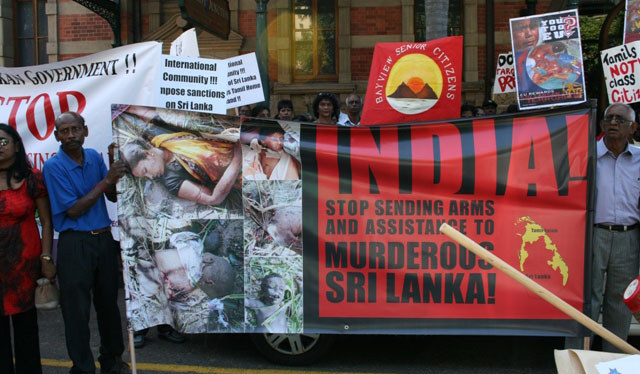TMVP, UPFA sweep eastern polls as TNA, UNP boycott
Amidst a boycott by the main opposition and the main Tamil party on the island, the Sri Lankan government party and a paramilitary group allied with it claimed victory in the Batticaloa Municipal Council polls held earlier this month.
Sri Lanka President Mahinda Rajapaksa's ruling United Peoples Freedom Alliance (UPFA), which contested jointly with the paramilitary Tamil Makkal Viduthalai Pullikal (TMVP), secured 11 seats with 14,158 votes. A coalition of other paramilitary groups won 6 seats, while the Sri Lanka Muslim Congress (SLMC) and the Eelavar Democratic Front (EDF) both secured one seat each in the Municipal Council.
The Tamil National Alliance (TNA) and the main opposition United National Party (UNP) did not participate in the election, citing the lack of conditions for free and fair polls.
Polls were also held for another eight local councils.
A TMVP candidate, Pirabakaran Sivakeertha, known as Pathmini, polled 4,722 preferential votes and was appointed Mayor of Batticaloa. She is the first woman to be appointed to the post.
Her father, Sathiyamoorthy Rajan, was a TNA candidate during the 2004 general elections, and was assassinated on the campaign trail.
Edwin Silva alias Piratheep Master, a TMVP contestant, who polled 3,805 was appointed Deputy Mayor.
The Mayor and Deputy Mayor of Batticaloa Municipal Council, chairmen and deputy chairmen of other eight local councils and the members of all nine local councils elected on the UPFA and TMVP tickets took their oaths in the presence of Sri Lankan President Mahinda Rajapaksa at the presidential secretariat on March 18.
Key Paramilitary operative, Sivanesathurai Chandrakanthan alias Pillayan, who was present at the presidential secretariat was greeted by Mr. Mahinda Rajapaksa.
The seven members elected from the SLMC did not attend the function and they will take their oaths in their own area in the presence of their leader Rauff Hakim, the party secretary M.T.Hassan Ali said.
Elected members of the other paramilitary and ex-militant groups were also not present to take oaths.
Voter turnout was at 53 percent in Batticaloa city, with around 10% of the voters who turned up casting invalid votes.
Meanwhile, the Special Task Force (STF), which had occupied the Batticaloa Municipal Council office, vacated the premises. The compound had been occupied by the Sri Lanka Army and the STF for over 18 years.
The office, hall, store and 3 guest houses in the Batticaloa MC building complex have been taken over by the Municipal Council Commissioner, who will be inspecting the buildings with a view to commencing their renovation.
Sri Lanka President Mahinda Rajapaksa's ruling United Peoples Freedom Alliance (UPFA), which contested jointly with the paramilitary Tamil Makkal Viduthalai Pullikal (TMVP), secured 11 seats with 14,158 votes. A coalition of other paramilitary groups won 6 seats, while the Sri Lanka Muslim Congress (SLMC) and the Eelavar Democratic Front (EDF) both secured one seat each in the Municipal Council.
The Tamil National Alliance (TNA) and the main opposition United National Party (UNP) did not participate in the election, citing the lack of conditions for free and fair polls.
Polls were also held for another eight local councils.
A TMVP candidate, Pirabakaran Sivakeertha, known as Pathmini, polled 4,722 preferential votes and was appointed Mayor of Batticaloa. She is the first woman to be appointed to the post.
Her father, Sathiyamoorthy Rajan, was a TNA candidate during the 2004 general elections, and was assassinated on the campaign trail.
Edwin Silva alias Piratheep Master, a TMVP contestant, who polled 3,805 was appointed Deputy Mayor.
The Mayor and Deputy Mayor of Batticaloa Municipal Council, chairmen and deputy chairmen of other eight local councils and the members of all nine local councils elected on the UPFA and TMVP tickets took their oaths in the presence of Sri Lankan President Mahinda Rajapaksa at the presidential secretariat on March 18.
Key Paramilitary operative, Sivanesathurai Chandrakanthan alias Pillayan, who was present at the presidential secretariat was greeted by Mr. Mahinda Rajapaksa.
The seven members elected from the SLMC did not attend the function and they will take their oaths in their own area in the presence of their leader Rauff Hakim, the party secretary M.T.Hassan Ali said.
Elected members of the other paramilitary and ex-militant groups were also not present to take oaths.
Voter turnout was at 53 percent in Batticaloa city, with around 10% of the voters who turned up casting invalid votes.
Meanwhile, the Special Task Force (STF), which had occupied the Batticaloa Municipal Council office, vacated the premises. The compound had been occupied by the Sri Lanka Army and the STF for over 18 years.
The office, hall, store and 3 guest houses in the Batticaloa MC building complex have been taken over by the Municipal Council Commissioner, who will be inspecting the buildings with a view to commencing their renovation.



